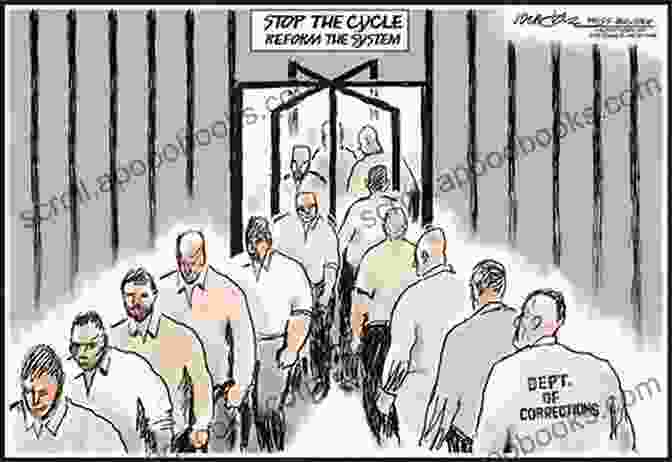The Familiar Fallacies of Criminal Justice Reform: A Critical Examination

In the realm of criminal justice, the pursuit of reform has sparked heated debates and polarized opinions. However, amidst the clamor, there lie certain persistent fallacies that have subtly shaped our perceptions and hindered genuine progress.
5 out of 5
| Language | : | English |
| File size | : | 1056 KB |
| Text-to-Speech | : | Enabled |
| Screen Reader | : | Supported |
| Enhanced typesetting | : | Enabled |
| Word Wise | : | Enabled |
| Print length | : | 163 pages |
| Lending | : | Enabled |
Fallacy 1: The "Soft on Crime" Myth

One of the most prevalent fallacies is the notion that criminal justice reform equates to being "soft on crime." This misconception stems from the assumption that reducing incarceration rates, implementing diversion programs, and addressing the root causes of crime somehow emboldens criminals and undermines public safety.
However, ample evidence suggests otherwise. Studies have consistently shown that mass incarceration does not deter crime; in fact, it can exacerbate social problems and result in higher recidivism rates. By focusing on rehabilitation, providing opportunities for reintegration, and addressing the underlying factors that contribute to crime, we can create a more just and effective criminal justice system.
Fallacy 2: The "Equal Protection" Fallacy

Another fallacy that permeates criminal justice reform discussions is the assumption that equal protection under the law means treating everyone the same, regardless of their circumstances or the nature of their crimes.
This fallacy ignores the systemic inequities and disparities that exist within our society and the criminal justice system itself. By advocating for equal outcomes rather than equal treatment, we can create policies that are more responsive to the needs of marginalized communities and break the cycle of mass incarceration.
Fallacy 3: The "Zero Tolerance" Fallacy

The "zero tolerance" fallacy suggests that the only way to reduce crime is through harsh punishments and unwavering enforcement. This approach has led to the criminalization of minor offenses, the expansion of police powers, and the disproportionate targeting of communities of color.
Research has demonstrated that zero-tolerance policies are ineffective and can actually increase crime by eroding trust between law enforcement and the communities they serve. A more balanced approach that focuses on restorative justice, community policing, and evidence-based interventions is essential for achieving sustainable public safety.
Fallacy 4: The "Private Prisons" Fallacy

The reliance on private prisons is another fallacy that has hindered criminal justice reform. Private prisons have a profit motive, which can lead to overcrowding, poor conditions, and inadequate healthcare.
By reducing our dependence on private prisons and investing in public institutions, we can ensure that the pursuit of justice is driven by public interest rather than financial incentives.
The Familiar Fallacies of Criminal Justice Reform provides a comprehensive analysis of these pervasive fallacies and offers a roadmap for a more just and equitable system.
By challenging these misconceptions, we can open ourselves to new perspectives, embrace evidence-based solutions, and work towards a criminal justice system that truly serves the needs of society.
5 out of 5
| Language | : | English |
| File size | : | 1056 KB |
| Text-to-Speech | : | Enabled |
| Screen Reader | : | Supported |
| Enhanced typesetting | : | Enabled |
| Word Wise | : | Enabled |
| Print length | : | 163 pages |
| Lending | : | Enabled |
Do you want to contribute by writing guest posts on this blog?
Please contact us and send us a resume of previous articles that you have written.
 Book
Book Novel
Novel Page
Page Chapter
Chapter Text
Text Story
Story Genre
Genre Reader
Reader Library
Library Paperback
Paperback E-book
E-book Magazine
Magazine Newspaper
Newspaper Paragraph
Paragraph Sentence
Sentence Bookmark
Bookmark Shelf
Shelf Glossary
Glossary Bibliography
Bibliography Foreword
Foreword Preface
Preface Synopsis
Synopsis Annotation
Annotation Footnote
Footnote Manuscript
Manuscript Scroll
Scroll Codex
Codex Tome
Tome Bestseller
Bestseller Classics
Classics Library card
Library card Narrative
Narrative Biography
Biography Autobiography
Autobiography Memoir
Memoir Reference
Reference Encyclopedia
Encyclopedia Brenda Lange
Brenda Lange Jennifer Betters Bubon
Jennifer Betters Bubon Brittni Chenelle
Brittni Chenelle David Mcdermott Hughes
David Mcdermott Hughes Bill Burnham
Bill Burnham Brent E Sasley
Brent E Sasley Brandon Ellis
Brandon Ellis Brenda Minton
Brenda Minton Kailin Gow
Kailin Gow Brent R Crandal
Brent R Crandal Booklist
Booklist Frank Koonce
Frank Koonce Bill Mitchell
Bill Mitchell Tao Yang
Tao Yang Bill O Reilly
Bill O Reilly Neelam Patel
Neelam Patel Bob Herz
Bob Herz Donald B Percival
Donald B Percival Billy Collins
Billy Collins Bori Kiss
Bori Kiss
Light bulbAdvertise smarter! Our strategic ad space ensures maximum exposure. Reserve your spot today!

 Daniel KnightSt. Patrick's Day Door Greeter: A Heartwarming Tale of Community and Canine...
Daniel KnightSt. Patrick's Day Door Greeter: A Heartwarming Tale of Community and Canine...
 Mario Simmons13 Steps to Peaceful Home: Transform Your Living Space into an Oasis of Calm
Mario Simmons13 Steps to Peaceful Home: Transform Your Living Space into an Oasis of Calm
 Vladimir NabokovUnleash Your Inner Artist: Counted Cross Stitch Patterns Cat Cross Stitch...
Vladimir NabokovUnleash Your Inner Artist: Counted Cross Stitch Patterns Cat Cross Stitch...
 Hunter MitchellRev Up Your Engines: Inside the Thrill-Filled Memoir, "Rockers and Rollers:...
Hunter MitchellRev Up Your Engines: Inside the Thrill-Filled Memoir, "Rockers and Rollers:... Virginia WoolfFollow ·9.5k
Virginia WoolfFollow ·9.5k Don ColemanFollow ·4.7k
Don ColemanFollow ·4.7k Colby CoxFollow ·13.5k
Colby CoxFollow ·13.5k Jason ReedFollow ·10.4k
Jason ReedFollow ·10.4k Felix CarterFollow ·10k
Felix CarterFollow ·10k Jamie BellFollow ·13.1k
Jamie BellFollow ·13.1k Aron CoxFollow ·16.9k
Aron CoxFollow ·16.9k Hunter MitchellFollow ·3.9k
Hunter MitchellFollow ·3.9k

 Corey Green
Corey GreenHuman Geography: A Concise Introduction by Gilbert...
A Journey into the Dynamic Realm of...

 Julian Powell
Julian PowellTrain Your Mind to Make Great Art a Habit
Do you dream of...

 Matthew Ward
Matthew WardSmall Town Romance: Heart Compass
Escape to Willow Creek, Where...

 Neil Parker
Neil ParkerMusic, Social Media, and Global Mobility: Exploring...
: The Convergence of Music, Media, and...

 Seth Hayes
Seth HayesUnlock the Potential of Potential Theory with Brooke...
Embark on an...
5 out of 5
| Language | : | English |
| File size | : | 1056 KB |
| Text-to-Speech | : | Enabled |
| Screen Reader | : | Supported |
| Enhanced typesetting | : | Enabled |
| Word Wise | : | Enabled |
| Print length | : | 163 pages |
| Lending | : | Enabled |






